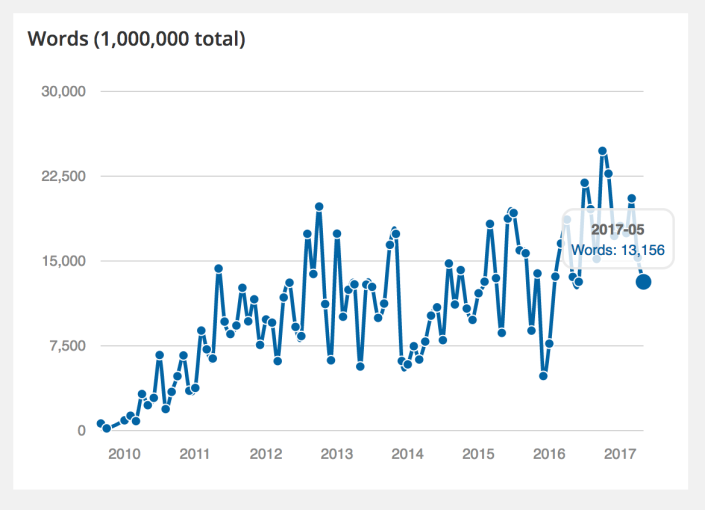A Million Words Published at Work in a Remote Company
Three years ago, I shared 10 lessons from working 4 years remotely, and today I passed another milestone while working at a remote company. After almost 7 years of working at Automattic, today I published my millionth word.
The amazing thing is every single one of these words is searchable, indexed, and transparent to all 500+ of my colleagues, no matter when they started working at the company.
How are my stats looking overall? Up and to the right, of course. 😀 This is a chart of my posts and comments inside the company over time.

It’s an amazing feeling to be able to know that your work is accessible by anyone in the company: the lessons learned, the mistakes, the decisions, the processes documented, and even the predictions which might have been too early for their time. I love being able to link back to something I mentioned in 2011 which is now relevant. It’s not even that bad seeing where you were wrong in the past – you’ve learned so much along the way!
This word count includes both my posts I’ve authored as well as comments I’ve made on colleagues’ posts and in our Field Guide, a superset of our documentation. It doesn’t include the most-likely millions of words typed in IRC, Skype or Slack over the years, but the important things were published, shared, and kept if ever needed.
How, What, Why to Document (and Publish) at Work
Someone asked Automatticians working at Automattic longer than 5 years to give advice to their newer colleagues (the thread I found easily by searching!) and my advice is something I take to heart every day, and working for a distributed company makes it much easier to put into action – we love documentation!
Work as though you’re constantly training your replacement: document, explain, and be as public as possible with decisions / discussions – leave a trace! Your colleagues will appreciate it, your team can learn and grow because of it, and you’ll (most likely) still have a job.



Unfortunately, even in a remote company such as Automattic we still have a few people who haven’t fully embraced the need to document what they know or who they talk to, perhaps thinking it keeps them in a position of importance. Sharing and documenting what you know does not result in a lack of job security!
Some of the best colleagues I have are meticulous sharers and documenters, and they want others to pick up where they left off, which is especially important when working in a completely distributed company which relies on asynchronous communication. And I totally admire that.
Could you be sharing or documenting more?
- If you’re the go-to person for something in your company, consider how much of it is just gatekeeper information you could document properly to help someone else learn/grow from or work on independently.
- Separate out processes and historical background from your strategic expertise. Processes and backstory are not really ‘what you know.’ It’s much better to be a person someone asks ‘why’ or ‘when’ to do something vs. the logistics of a ‘how.’ How can and should be documented for others to build off of regardless of your involvement. This should free you up to be more involved in the why, the new, and the next of your work.
- If you’re repeating yourself in private chats or (gasp!) email on a specific topic, document it. That’s also what drove me to create this blog – being able to answer someone’s question with an answer you’ve already carefully crafted for someone else is a great feeling (and a great use of your time)!
- Will someone want to know why you decided or executed something a specific way later? Share as much background as possible so colleagues are brought up to speed immediately. Share the setup & thought process you went through, where to find more information, and even the facts, ideas, or information you considered but deemed outside of scope for the particular project. My goal is to hopefully never have someone ask “where did this come from?” or “what’s your source?” or “did you consider this?” (when I had) and instead focus on enriching the discussion or challenging my ideas vs. asking me for information I should have provided in the original post.
- Gather the best, most complete, or authoritative things you’ve authored and submit them as potential onboarding materials for new team members. Challenge them to ask questions and to find something you need to document.
- If important progress is made, be sure to update your documentation, or retire in favor of something newer or more complete. We do this by linking from old posts to new ones, and all it takes is a quick comment and a link on an old post.
If you’re curious what we use at Automattic to document all of our work, you can check out https://p2theme.com/ which is the theme we apply to WordPress, making it possible to publish from the front-end and make use of threaded comments, which really encourages both rich publishing and discussion at the same time. And we interconnect the several hundred p2s and the information they contain through hyperlinks, x-posting to other p2s (like a cc: on an email), and making the entire thing indexed and searchable internally.
Here’s to a million more!
Also check out How to Get a Remote Job (and Pitfalls to Watch Out For) and yes, we’re hiring at Automattic.
